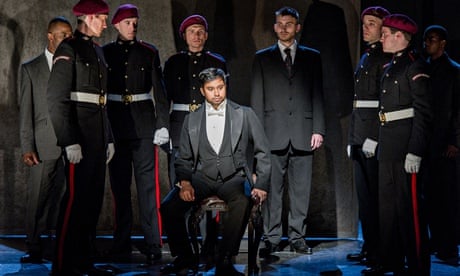Aldeburgh festival's contribution to this year's commemoration of the outbreak of the first world war is a new production of Britten's most explicitly pacifist opera. Commissioned for television and based on a short story by Henry James about the only surviving descendant of an ancient, fiercely military family who refuses to fulfil its expectations, Owen Wingrave is arguably the most problematic of Britten's major works: it's dramatically and musically uncertain, even routine.
Though Neil Bartlett's staging, with sets by Simon Daw and costumes by Sue Willmington, very clearly has something to say about the work, but it's not always obvious what, or whether it makes Wingrave more convincing theatre. The production suffers badly from extra-itis, in this case an all-male group mostly in present-day army uniforms, who are ever present on the fringes of the action – sometimes joining the Wingrave family to deride and threaten Owen, sometimes adding a general air of menace. They are, according to Bartlett's own synopsis in the programme, "the dead. All of them are soldiers, and at least one of them is a child killer." There are extra children, too, a pyjama-clad troupe of them, who get dragged off to unexplained fates by the soldiers.
Whether this all helps an opera that is stronger on ideas than characters is debatable; the claustrophobia of the Wingrave ancestral home, where Owen is pilloried by his monstrous family, is diluted by all these extraneous figures.
The singing, led by Susan Bullock as Jane Wingrave, Janis Kelly as Mrs Julian and Catherine Backhouse as her daughter Kate, with Richard Berkeley-Steele as the unbending Sir Philip, is uniformly fine, but none of them emerges as more than a cipher, while Ross Ramgobin never defines Owen as the unheroic hero he should be. Only Jonathan Summers as Spencer Coyle, the one person who respects and understands Owen's stance, seems to be flesh and blood, and even Mark Wigglesworth's vivid conducting, using David Matthews' tellingly refined chamber version of the score, can't add what's missing.

Comments (…)
Sign in or create your Guardian account to join the discussion